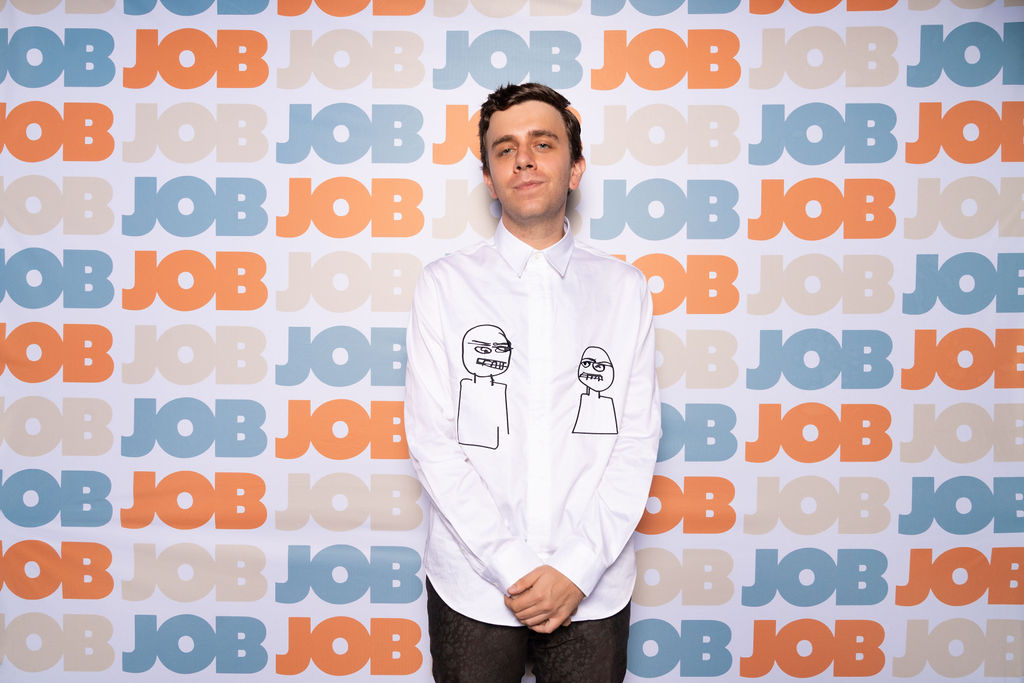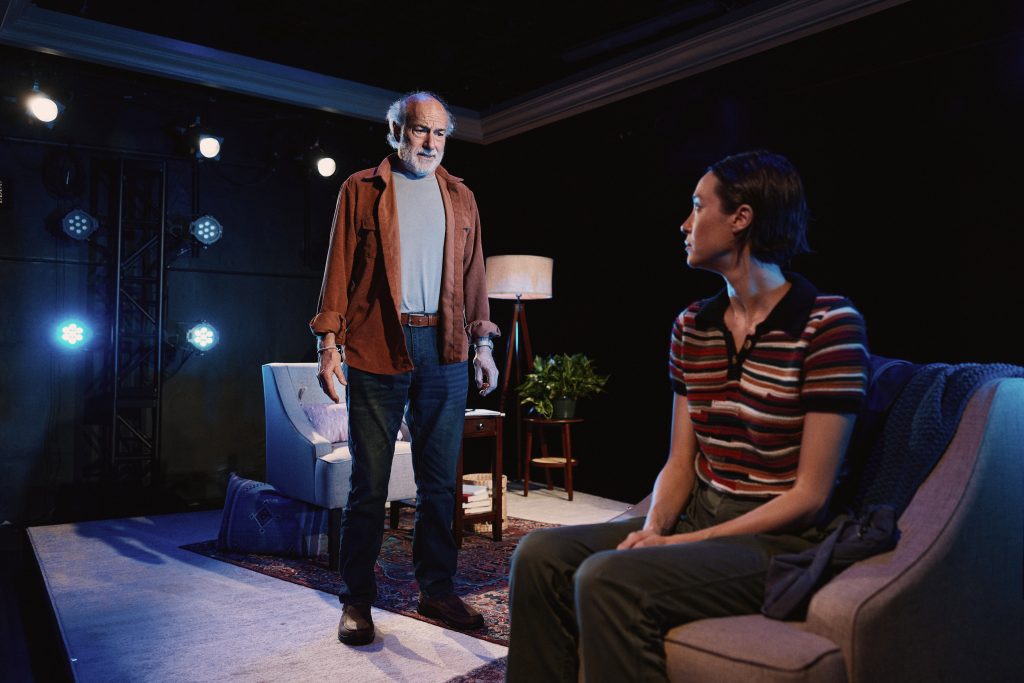- Interviews
The ‘Rorschach Test Possibility of Theater’: An interview with Job playwright Max Wolf Friedlich
January 12, 2024
•
By Katie Devin Orenstein
Max Wolf Friedlich made a splash this fall with the world premiere of his play JOB. Starring Sydney Lemmon (Tár) and Peter Friedman (Succession), and directed by Friedlich’s longtime collaborator Michael Herwitz, the psychological thriller about tech workers in San Francisco, opened last October at Soho Playhouse. Now, the new play moves to the Connelly Theatre beginning on January 19th.
We recently spoke to Max about his inspirations, from Martin McDonagh to AI Instagram influencers, and how the production hopes to bring new audiences to the Off-Broadway space.

This interview has been edited and condensed for clarity.
Broadway’s Best Shows
Congratulations on the upcoming remount of Job at the Connelly! I’d love to know your influences, and how this script began.
Max Wolf Friedlich
I think at my core, it was growing up seeing Conor McPherson plays and Martin McDonagh plays, and Jez Butterworth and Sarah Kane, very British [and] Irish. Dark, twisty, supernatural, perverted, surreal, but also very real, often with a horror element. I think those were the things that as a kid were really foundational, and they are the kind of writer I still aspire to be.
Job is not the most autobiographical work. I started writing it as part of a theater development group in LA in fall of 2019. We were really actively working on it until the final preview that we locked. This past summer, we did a week-long workshop, where going in the script was 14 pages longer [than it is now.]
BBS
That was a very fruitful workshop if you cut 14 pages! Congratulations.
MWF
Thank you! I have worked with our director, Michael Herwitz, and our dramaturg-slash-producer Hannah Getts for many years. I write the plays, but we really develop [them] as a core trio. To be honest, it was pretty seamless. Where the play comes from is twofold. One is, I met someone at a party who had the job that is portrayed in the show, working in content moderation [for social media.] And the other element of it was, I worked for this very strange tech company that built fictional influencers, the most famous of which was called Lil Miquela.
So I have the strange experience of being a famous woman on the internet by playing this character professionally. The parts of the play that are really autobiographical are like, when you have 1.3 million followers, and you’re portraying a 19-year-old young woman–I didn’t mainline the internet the same way that the character in the play does–but, I could look at my phone any hour of the day, and someone [would be] saying something really heartfelt, or really disturbing, or very weird, or, you know, “I’m in the Philippines, I love your fashion.” That’s crazy. It’s literally me, you know?
BBS
That sounds like a truly surreal experience.
MWF
Really ran the gamut from Martin McDonagh to fake influencers. Yeah.
BBS
I’m imagining you at eight years old, just reading The Pillowman.
MWF
Maybe not eight, but probably…10. Yeah.
BBS
What was the theatrical experience that got you from a general interest in theater to playwriting?
MWF
I was a really self-conscious kid, which is why my mom suggested that I try acting. I really didn’t enjoy being on stage in that way. I didn’t like being told what to do. And then I wrote a Christmas play that I won’t disclose the details of because I picked it up again recently, like 10 years later, and it’s the next play that I want to do [after JOB.] It was a very perverse Christmas play. And my eighth grade English teacher, Mr. Byrne, was like, “I need to tell your parents about this. Because this is disgusting.” And also, “This is great, and you should keep going.”

BBS
The play takes place in a therapist’s office. And without saying too much, it is about a woman, Jane, who has been deeply traumatized. The show is constantly questioning mental health care, its relationship to being a participant in labor, and then also how trauma functions [in the brain].
MWF
Yeah. I did very little research into the actual job. That is encapsulated in the fact that it used to be fairly obvious that Jane worked at a very specific company. And then we were like, well, we’re not really doing the due diligence. We’re not representing these people. So the play is really an accentuated hyperbolic version of what it is to be on the internet. The experience of being online and growing up online is so ubiquitous that we don’t think of ourselves as having our brain chemistry altered and having seen traumatic images and had experiences that we shouldn’t have had, due to our access to the internet.
There’s a lot of my own relationship with therapy too, which is I think a very uneasy one. I don’t go, not currently, but, I have historically gone. I think therapy is good. But I’ve always been unnerved by that relationship and being like, Who is this person? What have they done? I had a therapist once who, anytime I’d mention something in my relationship, he would be like, “women can be really difficult.” And then I found out through our setting [that] he was divorced. And I was like, “Okay, you’re kind of bringing your own stuff.”
I’m more interested in the Rorschach test possibility of theater, rather than being like, this is where I want you to get to. I think anything people take away from it is something that I’m cool with.
BBS
You’ve spoken about how this play is about and for young people. Can you tell me more about how Job is trying to show young people that theater can be about them?
MWF
I’m an avid theater goer. I grew up in New York and have seen a s***load of theater, and I simply don’t see a lot of things that address our generation’s experience. And I think that that can exist across lines of race and gender and sexuality. JOB is really about our modern relationship with labor. First and foremost, it’s a play about how Millennials and Gen Z see work and see their role in the world. We were really conscious [of that] in our branding. We used photographers and graphic designers who typically work in music editorial, because we didn’t want it to look like a play. Which – accessibility means a number of things, right? There’s very tangible things like ticket prices. And then there’s things in the middle. How do we actually reach this audience? You can make your ticket prices as low as you want but if the content isn’t for the demographic that it seeks to reach, and if you’re not reaching them, then there’s no way to get them there. It’s little things. I’m a huge advocate of saying, “hey, doors at 6:30, show’s at 7”, because, when young people go see music, and it says the show’s at 7, the show is never actually at 7. It lets people know that this is for them, that there aren’t tricky rules that they don’t understand. As a young person seeing theater when I was 10, or 11 or 12, I was made very aware that I was an outlier in those spaces. I don’t want 10 year olds coming to see JOB, to be clear!
BBS
Ha, yeah, I was going to say.
JOB starts performances at the Connelly Theatre, 220 East 4th St, January 19th, and runs through March 3rd. $32-$127.